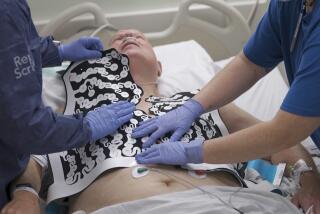AIS Laser for Use in Heart Wins FDA Approval
- Share via
IRVINE — Advanced Interventional Systems said Friday that it has received federal Food and Drug Administration approval to market a laser system to clear blocked coronary arteries, the first laser ever approved for use inside the heart.
But several cardiologists were highly skeptical of the announcement.
Jonathan Tobias, director of the cardiac catheterization laboratory at UCI Medical Center in Orange, said the data does not support the manufacturer’s claim that the laser device is better than the balloon angioplasty procedure, an alternative to coronary bypass surgery for some heart patients.
“People love lasers. It’s one of the sexiest new medical technologies,” Tobias said. But while patients want “ ‘Star Wars’ technology” to fix their hearts, the devices are expensive and unproven, he said.
“I wouldn’t say it’s a sham, but I’d say it’s getting close, until more scientific proof is available,” he added.
But AIS Chairman Robert Wall said the Dymer 200 laser had achieved a 90% success rate in tests on 3,000 patients at institutions including Emory University in Atlanta, Cedars-Sinai Medical Center in Los Angeles and Massachusetts General Hospital in Boston.
The laser procedure could benefit some patients who would otherwise require coronary bypass surgery and is more effective than balloon angioplasty for treating large blockages of 20 millimeters or more, Wall said.
Moreover, the catheter that is fed into the heart is flexible enough to be used in arteries where balloons cannot reach, with fewer complications, the company said.
“Lasers have had a very bad reputation,” said AIS President Tom Allen. While early lasers and catheter attachments have had severe deficiencies, the AIS system has overcome those problems, Allen said.
“Our data is as good or better than balloon angioplasty on (blockages) that you just can’t treat with balloons,” he added.
Although AIS is the first company to receive federal approval to market a laser for removing plaque inside the heart, other lasers have been approved for removing fatty deposits in arteries in the legs.
About half a dozen companies are racing to develop lasers for coronary use. Several, including Trimedyne Inc. in Irvine, are conducting clinical trials.
Industry analysts have predicted that coronary lasers, if accepted by doctors, have a potential market in the hundreds of millions of dollars, and saw the bid as a major boon for AIS, which made its first public offering in November.
The National Assn. of Securities Dealers Automated Quotation system suspended trading in AIS stock just before the company’s announcement at noon Friday. The stock rose 75 cents to close at $17 a share before trading was halted.
“There’s plenty of money for the first two or three successful companies,” said Chriss W. Street, president of the Reorganized Securities Group in Los Angeles.
Street said balloon angioplasty has become a $1-billion annual business. About 300,000 Americans had the procedure last year, compared to about 270,000 who had coronary bypass surgery.
But while coronary bypass surgery can cost $40,000, laser angioplasty is far less traumatic for the patient and its estimated cost is $3,000 to $4,000, Street said.
Wall said AIS plans to market the laser to the top 200 laboratories and universities that perform the lion’s share of the heart procedures. Each laser sells for $245,000, and the disposable catheter attachments that go inside the heart average about $850 each.




